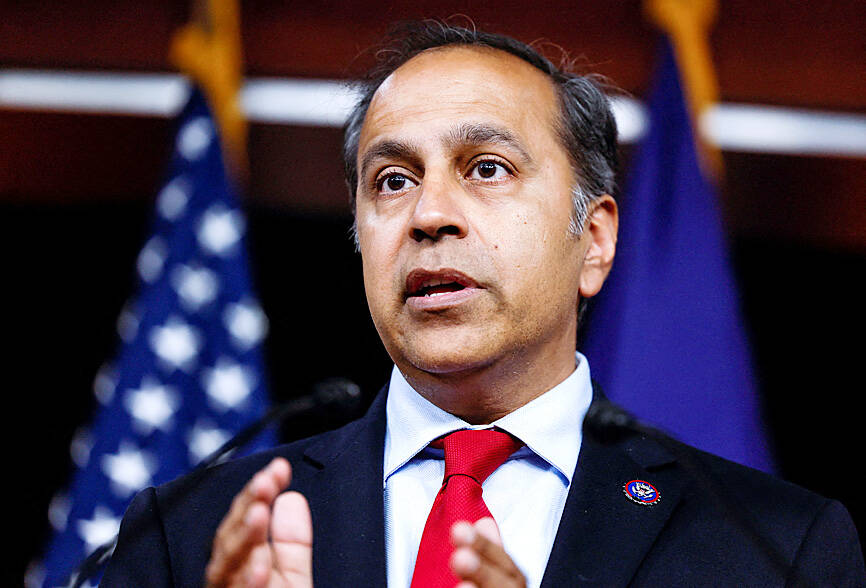US Representative Raja Krishnamoorthi on Monday said he plans to soon reintroduce a bill to support international development projects in countries with official or strong unofficial relations with Taiwan.
The Taiwan Allies Fund Act is to be introduced “in the very near future,” Krishnamoorthi told an online discussion on “how Beijing lures Taiwan’s diplomatic partners into switching recognition” hosted by the Atlantic Council.
Krishnamoorthi is a member of the US House of Representatives Select Committee on the Strategic Competition Between the US and the Chinese Communist Party (CCP).

Photo: Reuters
“The US has to do everything in its power to protect Taiwan’s rightful international place. Taiwan is not just a valuable international partner, it’s a beacon of freedom and democracy, too,” Krishnamoorthi said.
Through economic coercion and “opaque agreements,” China has pressured countries to switch diplomatic ties away from Taiwan, Krishnamoorthi said, citing countries such as the Solomon Islands and Nauru.
Nauru, which switched diplomatic recognition away from Taiwan following last year’s presidential election, demonstrates how China “punishes” Taiwan for its democratic choices, Krishnamoorthi said.
“This cannot continue to happen until those who recognize Taiwan become zero, which is what Beijing wants,” he said.
The difference between the US and Beijing is that while China seeks to extract political gains, the US works to promote “development, progress and opportunities” around the world, he said.
The goal of the Taiwan Allies Fund Act is to support projects that deepen international security and include Taiwan in sustainable development efforts, he said.
The bill would authorize aid to countries with official or strong unofficial relations with Taiwan, he added.
“This bill pushes against the CCP’s illegitimate claim that Taiwan cannot play a role in the international community,” he said.
The bill would enable sovereign nations to make decisions free from coercion, he said, adding that it would be a bipartisan and bicameral bill.
Last year, Krishnamoorthi and other members of the committee proposed the bill to provide foreign assistance to countries that advance Taiwan’s participation in international bodies, counter China’s influence and propaganda, or diversify supply chains away from China.
That bill would have allowed eligible countries to receive up to US$5 million annually from a broader Countering the People’s Republic of China Malign Influence Fund.
Krishnamoorthi also slammed the administration of US President Donald Trump for cutting foreign aid and dismantling the US Agency for International Development (USAID), calling it “outrageous, dangerous and self-sabotage.”
Given that the CCP is increasingly active in “extracting political gains from the developing world,” the US also needs to be “stepping up our global position, not kneecapping ourselves,” he said.
While Krishnamoorthi did not reveal details of the new legislation, the version of the bill he cosponsored last year would have authorized US$120 million in funds over three years to be distributed by the US Department of State and USAID.
Reuters last year reported that a Taiwan government official said that Beijing had offered Nauru US$100 million per year to cut its ties with Taiwan.

Nipah virus infection is to be officially listed as a category 5 notifiable infectious disease in Taiwan in March, while clinical treatment guidelines are being formulated, the Centers for Disease Control (CDC) said yesterday. With Nipah infections being reported in other countries and considering its relatively high fatality rate, the centers on Jan. 16 announced that it would be listed as a notifiable infectious disease to bolster the nation’s systematic early warning system and increase public awareness, the CDC said. Bangladesh reported four fatal cases last year in separate districts, with three linked to raw date palm sap consumption, CDC Epidemic Intelligence

Two Taiwanese prosecutors were questioned by Chinese security personnel at their hotel during a trip to China’s Henan Province this month, the Mainland Affairs Council (MAC) said yesterday. The officers had personal information on the prosecutors, including “when they were assigned to their posts, their work locations and job titles,” MAC Deputy Minister and spokesman Liang Wen-chieh (梁文傑) said. On top of asking about their agencies and positions, the officers also questioned the prosecutors about the Cross-Strait Joint Crime-Fighting and Judicial Mutual Assistance Agreement, a pact that serves as the framework for Taiwan-China cooperation on combating crime and providing judicial assistance, Liang

The manufacture of the remaining 28 M1A2T Abrams tanks Taiwan purchased from the US has recently been completed, and they are expected to be delivered within the next one to two months, a source said yesterday. The Ministry of National Defense is arranging cargo ships to transport the tanks to Taiwan as soon as possible, said the source, who is familiar with the matter. The estimated arrival time ranges from late this month to early next month, the source said. The 28 Abrams tanks make up the third and final batch of a total of 108 tanks, valued at about NT$40.5 billion

Reports of Taiwanese going missing, being detained or interrogated, or having their personal liberties restricted in China increased about fourfold annually last year, the Mainland Affairs Council (MAC) said yesterday. Last year, 221 Taiwanese who traveled to China were reported missing, were detained and interrogated, or otherwise had their personal freedom restricted, up from 55 the previous year, the council said. Reopening group tours to China would be risky, as it would leave travelers with no way to seek help through official channels after Beijing shut down dialogue between the associations tasked with handling cross-strait tourism, the MAC said. Taipei’s Taiwan Strait Tourism